Flights of Tom Claytor:
The
Journals of a Bush Pilot
Travelling Though
Africa
![]()
Tom Claytor is currently flying a C180 solo around the
world.
![]()
I am in trouble again. There are soldiers around the plane; there are also
200 enthusiastic children who want to shake my hand. This is an extraordinary
island; the only trees are towering baobobs and the odd mango. I am taken off by
the military to see Inspector M. B. Kalimanjira of the Malawi Police. We are in
Mozambican waters, but the island belongs to Malawi. The inspector escorts me to
see T. A. Mkumpha. "He is the chief," I am told, but the T. A. stands
for territorial authority.
I am noticing that there are not many middle-aged people on the island. There
are old people, and there are young people, but not many in between. "There
is no work here," the inspector tells me. Above us on the hill is a
colossal stone structure - one of the oldest Anglican missions in the country.
"That is another reason," I am told, "many of the people in the
government today were educated here." I greet the T. A. in Swahili, and we
talk about what fish they like to eat in Tanzania. The first shot of World War I
was fired north of here. The English left Karonga by boat to play football
against the Germans. The Germans had heard the news, so they fired a shot across
their bow and sent them home. The Africans called that the "tenga-tenga
war." Tenga means to bring, and in that war they were carrying everything
everywhere. The soldiers don't speak Swahili, but they are starting to wonder
what fish and Germans in Tanzania have to do with a flight clearance to land at
Likoma.
All the baobobs on the island have long striations around their trunks. They
look like a big cat has clawed at them for many years. The islanders strip the
bark from the baobobs, then soak it in water to tie their fences and houses
together. The sun tightens and dries them securely. I am offered a white powdery
substance in a shell. It is the seed of a baobob, and it tastes like sour clumps
of talcum powder. All of the mango trees on the island are owned by people who
sell or eat the mangoes. This is why they probably haven't been cut down for
fire wood. The baobob is too soft to use as firewood, and the seed pods are in
demand.
"You better have a strong promise," a young man tells me. I am not
quite sure what he means. "Once you eat that seeds of the baobob, you will
have more sperms and greater inflation of the 'mbolo.' You better have a strong
promise, or you will be in trouble." Joseph Chirwa is a teacher on the
little island Chizumulu, and he smiles as he says this. I have just met this
man, and I am not sure that I heard him correctly. He explains that the witch
doctors mix this seed with other roots and yellow flowers and that it works.
"It is all about power," he says. The two most powerful witch doctors
on the island are having a war at the moment; it is to see who has the most
power. "I thought the T. A. had all the power," I ask. "This is
about real power," Joseph says.
"AIDS comes from the moon," a police officer in Karonga believes.
He tells a traveler that it was Neil Armstrong who brought it back on his boot.
"All women have female AIDS, and some men have male AIDS; if the AIDS gets
together and multiplies, then you die," he believes. I am reminded how a
good story can grow and spread like a bush fire in the wind. Joseph tells me
that when he was younger, he was a good student. The other students were jealous
of him, so they put a spell on him - 'juju' it is called - so that he couldn't
read. "The front part of my brain was in the back, and the back part was in
the front," Joseph explains. "I was in form 4 at school at the time. I
went to see Dr. van Niekerk in Nkata Bay, then spent one month in the hospital.
They were giving me 'psychrobipic medication' because of tensions in the
brain," he says. When the hospital failed to cure Joseph, he went to the
"sing'anga" - the witch doctor. He had to collect water from the
middle of the lake, resin from a certain plant, and a pigeon. The pigeon was
cooked alive in the water. "Three months after I ate it, I could read
again," Joseph says.
The ants are called 'nyerere,' and they are biting my feet. Since this is my
first visit here, I have been instructed to take my shoes off and to choose a
stick from a cassava field. I am carefully led through the village to a young
girl on the inside of a stone ring. The ants don't seem to be biting her feet,
and I hand her the stick. I am now permitted to enter the compound. There is a
baboon chained by its back leg to the root of a tree. It has been there for two
years; the chain is very short. "Do they ever let it go?" I ask.
"No," I am told. This is the place of the sing'anga - Dr. Kumpolota -
the most powerful witch doctor on the island. There is a quiet and mysterious
feeling here. People look at you, but they lower their eyes and don't say
anything. The "doctor" is just up the hill in a trance with some
women. We can hear his yells and calls from the hill, but he should be down
shortly. Joseph came here 3 years ago for "reinforcement of the body,"
he explains, because people were attempting on his life now and again with
'juju.' They had paralyzed his leg and closed his epiglottis, he tells me.
Joseph is a Christian, and the church is against his going to the witch doctor,
"but what else can you do against juju?" he asks. The
"reinforcement of the body" costs 40 Kwacha ($2.50). You supply your
own razor blade and the doctor cuts the skin on the forehead, chest, elbows,
shoulders, sides, knees, ankles and along the spine. He then rubs in special
roots with oil from a special plant. These tattoos are a permanent barrier
against spells being put on you, I am told.
What I find most interesting is that I am afraid to take a photograph of any
of this. "You must wait for the doctor," I am told. There is some
activity and the 'doctor' enters the compound. He appears to still be in a
trance. He moves with purpose and does not lift his head. He has on trousers
which are inside out with the pockets flaring like a skirt. His hair is a wild
affair with dreadlocks, and his shirt is also inside out. We all file into a
long thatched room and sit on woven mats with our legs stretched out before us.
The "doctor" is behind an alter in the front with his head resting on
its surface. He will occasionally lift his head and shake it with the sound and
vigor of one who is emerging from very cold water. I look above my head and see
the skin of a leopard and a zebra. I notice carefully the eyes of those who are
sitting around me. No one seems to notice me; all their eyes are fixed on Dr.
Kumpolota.
When he does rise, he stands tall before us and paces back and forth with his
pockets waving all around. His voice is loud and full of distorted inflection. I
can't understand anything that he is saying. He is yelling at us. A large group
of women move to the front. They present him with small children. He wraps each
in turn in a cloth, spits on their heads, then rubs the spit with his thumb and
lifts them into the air. His face is powerful. The longer I sit there, the more
I look at the eyes of those around me to try to read what is going on. I can see
Joseph looking at me, but I can't tell why. It is so strange to be in a place
and to not know if you are welcome or if you are being talked about. At one
point, a woman rises and speaks out loud; I hear the words, "mzungu ya
ndege" - the white with the airplane - and I know I am being talked about.
Again, I respectfully scan the eyes of those around me to see how things are
going. It is a little scary. I am not sure if the witch doctor is a friendly
man. I can feel the power he has over people; I can see it on his face and
theirs. I get the feeling that if he declared me an evil spirit and told the
people to jump me and kill me, that they would in an instant. It would be
nothing personal; it would only be because I was an evil spirit and they were
told to do it.
A woman then moves forward to the alter and reads from a book in Chichewa.
Joseph leans over to tell me that it is the Bible, Romans 12: verse 11, and the
doctor has told her to welcome me. I am relieved and surprised. I stand to
accept the welcome and to explain that I have come from America and that I heard
of Dr. Kumpolota, and it is now an honor for me to meet him. I think the doctor
is very pleased with my speech. The ceremony then turns to the subject of funds
and that the doctor is in need of funds to assist with his work. Joseph is busy
translating all of this to me. The doctor tells me of how he also was too
intelligent when he was young, but someone did 'juju' to him and he went mad. He
walked naked in the bush, and ate human feces and drank urine. In 1973, his
mother died in Nkata Bay, and something happened to him. He was called by the
central spirits to Mkuwazi mountain. There he was given the special stick 'Ndodo.'
He went to Chief Mpima on Likoma to beg permission to start practicing as a
witch doctor, but was told that he first must be tested and licensed by the
District Commissioner's office in Nkata. When he returned to Likoma, he
predicted that a certain boy would be struck by lightning. This happened, and
the people began to flock to him.
The witch doctor is not just a witch doctor, but also a herbalist, I am told.
This is a form of traditional medicine which administers roots and various
ointments for curing physical sickness. The doctor tells me that if it is a
sickness that he does not understand, then he sends the people to Misozi
Hospital for medical treatment. I am impressed by this. I can see the very clear
role that this man plays on this tiny island. There is a realm in our minds that
is not physical. Some things cannot be fixed by medicine. Some things are not
within the complex structure of a religion. If you believe that someone has cast
a spell on you or that your mind is not right, you go to the witch doctor. He is
a doctor of the mind, a psychologist, with simple answers for complex problems.
The military is still agitated at my presence. Last night, I was loading
digital images into my computer. I turned on the lights inside the plane so I
could see. The soldiers were drunk and decided this must be a matter of national
security. Police Constable Joseph Kamapalira, who was guarding the plane, tried
to explain that I was only "loading pictures from my digital camera into my
computer to send by electronic mail to my webpage overseas," but this just
seemed to make things worse - so much for the truth. I am a little bit concerned
that one of the soldiers might now get the idea that I must not go, and that I
must be detained. In the distance, there is a bright red turban approaching upon
the head of a well dressed Dr. Kumpolota, followed by his entourage. I can
already hear the soldiers whispering among themselves that he is coming. Dr.
Kumpolota has come to see me off and to secure a sale. The soldiers step back
silently and watch from a distance. I am very happy to see the doctor; he has
brought me two medicines - the 'chitumwa' for the girls and a 'msiyeniapite' to
protect me on my journey. It seems to be working already. I pay him double for
his generosity, and we freeze in position and expression together for a
photograph. The doctor tells me that if I know other people who need his
medicine that they must write him: Dr. William Kumpolota, c/o Misozi Hospital,
Box 86, Likoma Island, Malawi, Africa. He is a good witch doctor to know on
Likoma island. 29 Apr 1996 - Likoma Island, Lake Malawi, Malawi
29 Apr 1996 - Likoma Island, Lake Malawi, Malawi
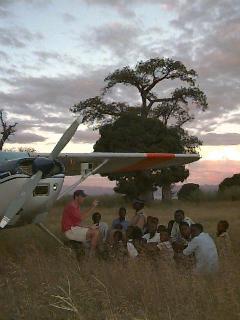 There is a courtyard with a strangler fig in the
middle. It has long since killed the baobob in the center, and now there just
remains a hollow lattice of fig that looks like a jail. On the far side of the
courtyard, we find the T. A. The military is already there. The T. A. was
banished to Tanzania for 30 years by Kamuzu Banda, but he came back last year
and was inaugurated as T. A. "People say that he will be the next president
of Malawi," the inspector tells me. The T. A. is sitting in front of the
bar with a dark green bottle of beer in his hand. His round spectacles are
pressed hard against his face, and the pools of sweat are collecting in the
bottom against his puffy cheeks.
There is a courtyard with a strangler fig in the
middle. It has long since killed the baobob in the center, and now there just
remains a hollow lattice of fig that looks like a jail. On the far side of the
courtyard, we find the T. A. The military is already there. The T. A. was
banished to Tanzania for 30 years by Kamuzu Banda, but he came back last year
and was inaugurated as T. A. "People say that he will be the next president
of Malawi," the inspector tells me. The T. A. is sitting in front of the
bar with a dark green bottle of beer in his hand. His round spectacles are
pressed hard against his face, and the pools of sweat are collecting in the
bottom against his puffy cheeks.
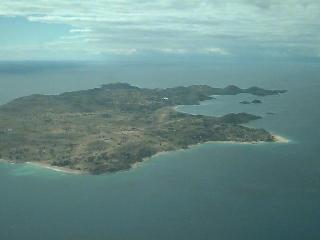 On the far
southern tip of the island, there is a stretch of white beach. It is a good
place to swim, because you can see if there are any crocodiles. It is also good
because there are no reeds, so there is less chance of catching bilharzia from
the snails. Joseph tells me about the witch in Makuzi who turned her daughter
into a hyena, so she could go out and steal babies at night. The mother was
dragged out of her hut and cut with razor blades. The cuts were then rubbed with
dirt. The woman later died from infection. A friend of this woman was later
asked how she could have let them do this, "well, she was a witch,"
she replied. "They love a good witch hunt here," Joseph tells me,
"especially when it involves hyenas and babies." Joseph's tales are
based somewhat on truth. I know an American missionary whose daughter was
previously grabbed by a hyena in this country. She saved her daughter, but lost
a portion of her fingers. Real hyenas are bold when they are hungry.
On the far
southern tip of the island, there is a stretch of white beach. It is a good
place to swim, because you can see if there are any crocodiles. It is also good
because there are no reeds, so there is less chance of catching bilharzia from
the snails. Joseph tells me about the witch in Makuzi who turned her daughter
into a hyena, so she could go out and steal babies at night. The mother was
dragged out of her hut and cut with razor blades. The cuts were then rubbed with
dirt. The woman later died from infection. A friend of this woman was later
asked how she could have let them do this, "well, she was a witch,"
she replied. "They love a good witch hunt here," Joseph tells me,
"especially when it involves hyenas and babies." Joseph's tales are
based somewhat on truth. I know an American missionary whose daughter was
previously grabbed by a hyena in this country. She saved her daughter, but lost
a portion of her fingers. Real hyenas are bold when they are hungry.
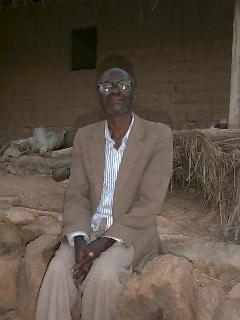 I sit down
next to a peaceful looking old man with glasses. His name is Nicolas Kawelama,
MD. He is a medical doctor. He was trained in Zomba, then worked in Zimbabwe for
22 years in the Masvingo hospital. He has now come back to Likoma to retire.
"Why are you here?" I ask. "I am told that I am a wizard,"
he replies. His daughter became very sick after giving birth. The child died,
and the daughter had vaginal wounds. All of the members of the family were
called here to see Dr. Kumpolata. "I was told that my daughter was
bewitched, and the stick fell on me," Nicolas says. The stick is Dr.
Kumpolata's tool for seeking out wizards; it is called 'ndodo.' Sitting next to
Nicolas are a string of elderly gentlemen. I am introduced to them - Gabrial
Kalamba, Vegheadman Mwiangi, Johan Kapalamba, Elasto Masanche, and Mr. Matundama;
they are all wizards. Nicolas' daughter was kept here for one month, and now
"she is back to life," I am told. Nicolas has now been here for 3
months. His wife and two daughters bring him food everyday. One of his sons is a
medical doctor in Zimbabwe, another son is a manager of a grain mill, and his
third son is a major in the Malawi Army. This seems to be a curious clash of two
very different worlds. "The only worry is that I am not doing
anything," Nicolas tells me; "it is a terrible thing." Sometimes
Nicolas is instructed to go dig up roots for Dr. Kumpolata. He must then return
to the compound. Nicolas tells me that the sing'anga has told him he will be
cured and free to go in a couple more days, but there is little doubt where the
power lies on Likoma island.
I sit down
next to a peaceful looking old man with glasses. His name is Nicolas Kawelama,
MD. He is a medical doctor. He was trained in Zomba, then worked in Zimbabwe for
22 years in the Masvingo hospital. He has now come back to Likoma to retire.
"Why are you here?" I ask. "I am told that I am a wizard,"
he replies. His daughter became very sick after giving birth. The child died,
and the daughter had vaginal wounds. All of the members of the family were
called here to see Dr. Kumpolata. "I was told that my daughter was
bewitched, and the stick fell on me," Nicolas says. The stick is Dr.
Kumpolata's tool for seeking out wizards; it is called 'ndodo.' Sitting next to
Nicolas are a string of elderly gentlemen. I am introduced to them - Gabrial
Kalamba, Vegheadman Mwiangi, Johan Kapalamba, Elasto Masanche, and Mr. Matundama;
they are all wizards. Nicolas' daughter was kept here for one month, and now
"she is back to life," I am told. Nicolas has now been here for 3
months. His wife and two daughters bring him food everyday. One of his sons is a
medical doctor in Zimbabwe, another son is a manager of a grain mill, and his
third son is a major in the Malawi Army. This seems to be a curious clash of two
very different worlds. "The only worry is that I am not doing
anything," Nicolas tells me; "it is a terrible thing." Sometimes
Nicolas is instructed to go dig up roots for Dr. Kumpolata. He must then return
to the compound. Nicolas tells me that the sing'anga has told him he will be
cured and free to go in a couple more days, but there is little doubt where the
power lies on Likoma island.
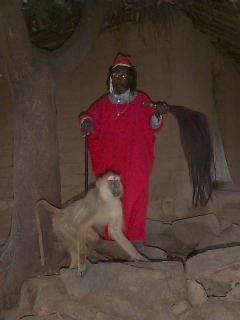 The doctor
tells me he would like to have his picture taken. The ceremony is either over or
put on hold, and the doctor disappears to adorn himself with a bright red robe,
glasses and a fly whisk. He poses by the baboon and freezes in position and
expression until the photograph is taken. I have now become what seems like an
honored guest. I am curious about the process of how the doctor determines
whether someone is a wizard or a witch. He shows me the special stick - the 'ndodo.'
It is thick at one end. The person being tested sits on a stool with their eyes
closed and both hands holding the thick end. The doctor sits opposite to them
with only his left hand on the stick. "When he pulls the stick, if you are
a wizard or a witch, you will be pulled off the stool like a piece of paper or a
chicken," Joseph says.
The doctor
tells me he would like to have his picture taken. The ceremony is either over or
put on hold, and the doctor disappears to adorn himself with a bright red robe,
glasses and a fly whisk. He poses by the baboon and freezes in position and
expression until the photograph is taken. I have now become what seems like an
honored guest. I am curious about the process of how the doctor determines
whether someone is a wizard or a witch. He shows me the special stick - the 'ndodo.'
It is thick at one end. The person being tested sits on a stool with their eyes
closed and both hands holding the thick end. The doctor sits opposite to them
with only his left hand on the stick. "When he pulls the stick, if you are
a wizard or a witch, you will be pulled off the stool like a piece of paper or a
chicken," Joseph says.
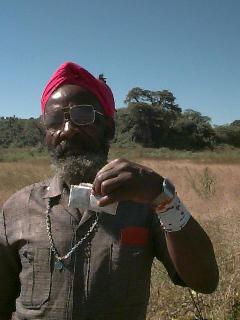 The doctor
and I walk up the hill together. He is finished with his work for the day, and
he wants to have a beer. Joseph translates between us as we move on to discuss
the problems of understanding women. He knows about this problem, he tells me,
and he has a medicine to get the girl. I can only smile at this. "How much
does it cost," I ask. "It is 100 Kwacha," he says. There are two
types. There is 'mankwala' which works very well, but some are suspicious of it,
because you have to make them drink it. The other is 'chitumwa' which is sewn
into a piece of white cloth. You can use it many times, "and you can move
with it." I get the feeling that the doctor is pressing for a sale, so I
offer him 75 Kwacha for the 'chitumwa' if it is ready before I leave.
The doctor
and I walk up the hill together. He is finished with his work for the day, and
he wants to have a beer. Joseph translates between us as we move on to discuss
the problems of understanding women. He knows about this problem, he tells me,
and he has a medicine to get the girl. I can only smile at this. "How much
does it cost," I ask. "It is 100 Kwacha," he says. There are two
types. There is 'mankwala' which works very well, but some are suspicious of it,
because you have to make them drink it. The other is 'chitumwa' which is sewn
into a piece of white cloth. You can use it many times, "and you can move
with it." I get the feeling that the doctor is pressing for a sale, so I
offer him 75 Kwacha for the 'chitumwa' if it is ready before I leave.

Tom Claytor
Continue with Part 8 of Tom in Africa. Click Here.
![]()
Note from the Editor. A link to Tom's latest reports can be found in the eBush Communications Page.
Use the attitude indicator as your guide back to Inside Africa.
Top of this story.

Last modified on
March 05, 2006 .
© Virtual Horizons, 1996.